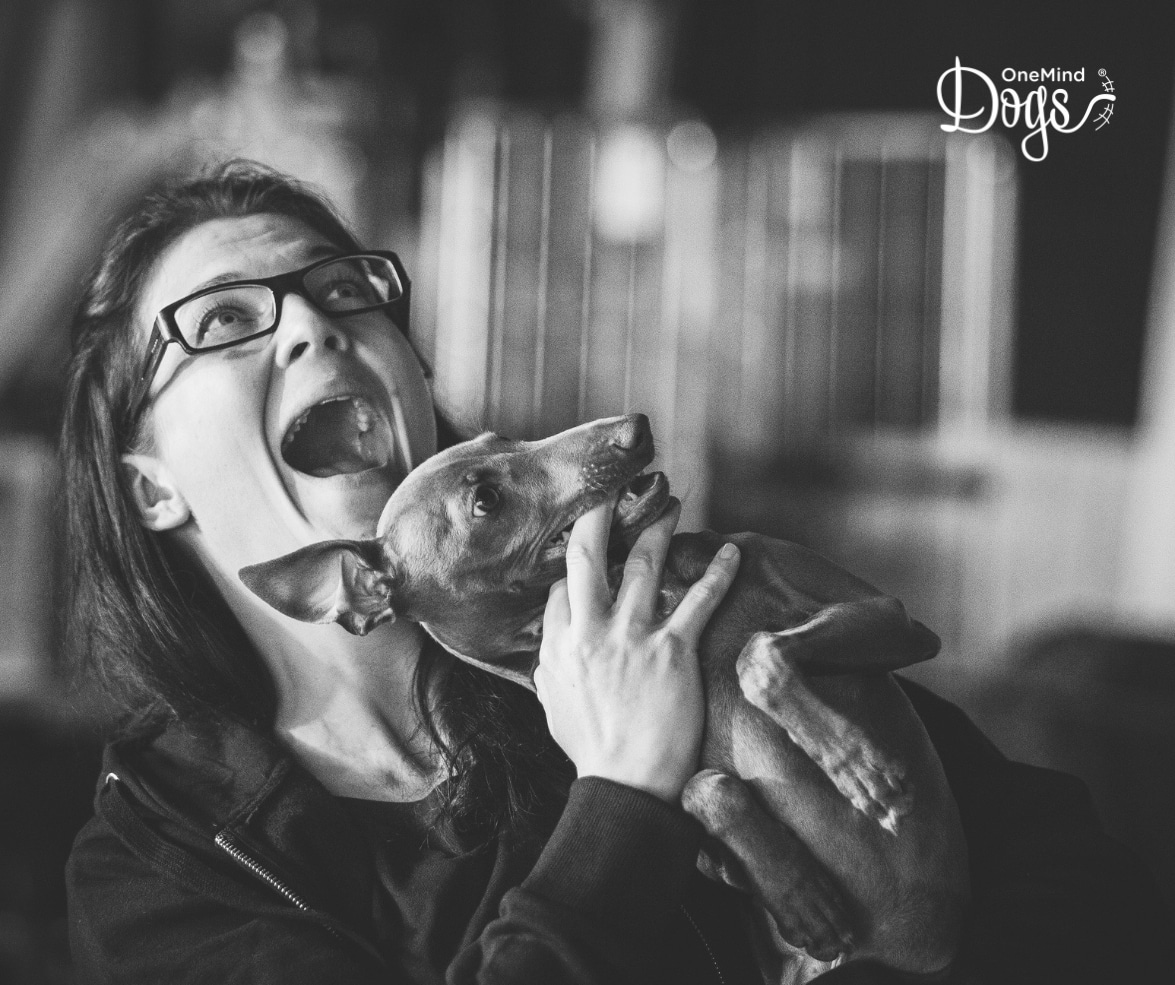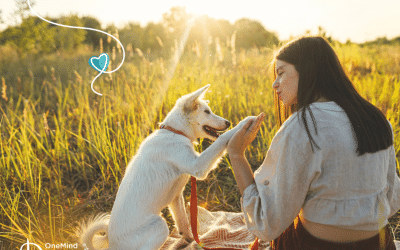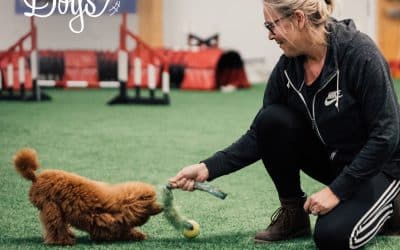Puppies explore and play using their mouths, chewing and biting are completely normal puppy behavior. However, it can be unpleasant and even painful if your cute pup gets carried away with those sharp baby teeth! So, when do puppies stop biting?
The good news is that with consistent training and by providing appropriate outlets, you can accelerate the process of teaching your puppy to moderate their biting. It will help transform your unruly pup into a polite dog.
Typically, puppies naturally begin biting less frequently and with less pressure around six months of age. However, the exact timing varies based on factors like breed size, individual maturity level, and the quality of training. With proactive and positive reinforcement-based teaching, you can help your puppy learn faster that human skin is extremely sensitive and that mouthing needs to be gentle.
Understanding the reasons behind puppy biting
Puppy biting stems from a combination of teething discomfort, developmental exploration, and early social play. Recognizing what drives this behavior will help you address it effectively through training and providing more suitable alternatives. To stop puppy biting and other problem behaviors more quickly — Discover how dogs think and why your puppy does all the crazy things they do with 50% off our OneMind Dogs puppy training app!
Puppy teething process
Puppies begin teething at around 2-4 weeks old. This process can cause sore, swollen gums. Chewing and biting provide relief for this discomfort. Typically, teething lasts until about six months of age, when all 42 adult teeth have emerged. During this phase, having various textures and temperatures to gnaw on can make all the difference in preventing pain.
The teething phase can be pretty unpleasant and painful for puppies. Their gums become inflamed as new teeth push through. Teething generally intensifies between 12 and 16 weeks old as the major molars erupt. Once all adult teeth have settled in around six months, discomfort subsides.
Developmental exploration
Young puppies are also hardwired to investigate their environment. They use their vision, hearing, and mouth to examine the textures, shapes, sizes, and abilities of objects around them. This innate curiosity helps them discover the world. However, at this stage, puppies are simply not yet aware of appropriate bite force when interacting with human skin. Through effective bite inhibition training, you can teach puppies to stop biting so hard.
Early social play with siblings can help stop puppy biting sooner
Prior to adoption, puppies first practice biting and mouthing behaviors with their littermates. It’s how they learn about play manners from an early age. When one puppy bites too hard, the sibling will yelp and stop playing. This feedback helps establish “bite inhibition”- understanding pressure thresholds.
Unfortunately, even puppy skin is way thicker than ours. It takes some time before they realize we have a different sensitivity level when bitten. As such, your pup is not purposefully trying to hurt you when it nips at your ankles or hands. They’re simply playing as they would with their littermates.
Maturation and it’s effect on puppy biting
As puppies mature physically and mentally, their natural inclination for frequent, hard biting reduces. Yes, there will be an end to your puppy’s biting habit! Developing jaw strength and adult teeth make chewing needs less intense. However, positive reinforcement training is the most impactful way to rapidly curb biting. With patience and consistency, you can convey that human skin is highly delicate and not an appropriate chew toy!
Pay close attention to times when tooth contact is very gentle or your puppy licks instead of nibbles when excited. Always praise and reward these desired behaviors. That reinforces that gentle mouthing or licking are good alternatives for your attention. If your puppy does bite, make a loud noise like “Ouch” and end the play session for a few minutes. Your puppy will soon learn that biting you means the fun stops.
As your puppy develops better self-regulation after play sessions and learns to moderate his bite force when prompted, you can rest assured that you’ve taken the first steps to stop puppy biting!
Indicators puppy is ready to stop biting
How do you know when the puppy-biting stage is finally ending? There are some key markers to look out for:
- Your puppy can inhibit their bite pressure when you give verbal cues, saying, “Ouch”
- After energetic playtimes, your pup can settle down without redirecting its mouthiness onto its hands or feet.
- Biting frequency during interactions has reduced significantly.
- Your dog displays calmer mannerisms and the ability to self-soothe without the need to gnaw.
Helping a puppy who still bites
While most puppies will stop biting on their own close to 6 months old, some pups need additional support if the it continues longer. Here are practical approaches:
Teach bite inhibition early on to stop puppy biting sooner
The goal is to convey that human skin cannot withstand sharp puppy teeth the way littermates did. Say a firm “yip!” or “ouch” when your puppy’s teeth make contact to signal exceeding tolerance. Any pressure from mouthing that does not cause discomfort should receive gentle praise and pets to encourage this gentler approach.
Start working on bite inhibition techniques as early as eight weeks old. The most crucial window is before 16 weeks, while your puppy is still young, impressionable, and forming habits. Making this distinction clear early on prevents problematic biting later.
Provide appropriate chew toys
Having a range of tempting chew toys and treats available provides an acceptable outlet for those natural chewing and biting impulses. Rotate novel textures and flavors to keep your pup interested and engaged. Interactive toys that can be stuffed with treats add mental challenges.
However, remember to only choose safe toys or treats that are the appropriate size for your pup. Toys that are too small can become choking hazards. And those that are too big may not be appealing to a teething puppy.
Acceptable chew toys/treats include:
- Soft rubber or rope toys
- Treat-stuffed Kongs
- Appropriate bones
- Bully sticks
- Natural dried treats like tendons or Himalayan Yak Chews
- Carrots
When puppies spend a lot of time chewing, they will naturally stop inappropriate biting more quickly.
Keep playtime with humans hand-free
It can be tempting to play roughhouse with your cute puppy using your hands and feet- but this actually unintentionally rewards them for biting limbs! Instead, channel that excitement onto tug toys! If your puppy persists in redirected biting behavior, calmly withdraw all attention until they settle down. As soon as biting stops, offer lots of praise and resume play with an appropriate toy instead.
But what about petting? After all, hands are one of the primary ways we bond with our pets. Well, the same logic applies when it comes to petting. Be sure to teach your puppy that gentle touch is preferred. If they get too excited and bite, immediately stop petting and only continue once your puppy has calmed down.
Allow social playtime with other dogs
Well-supervised interactions with friendly adult dogs that have good bite inhibition provide invaluable social learning opportunities that go a long way to stop puppies from biting. Adult dogs help convey manners for appropriate pressure and take feedback well when a bite is too hard. Carefully match playmates based on size, energy levels, and tolerance to prevent being overwhelmed.
If all else fails, get professional help to stop your puppy from biting
It is entirely natural for puppies to bite frequently and with intensity. Around six months old, biting behaviors tend to decline as maturity develops. However, positive reinforcement-based training accelerates the process of learning “bite inhibition.” This prevents mouthiness from becoming a problematic and persistent adult behavior.
With a bit of patience and consistency conveying sensitivity, providing outlets for chewing needs, and reinforcing gentler play manners, you’ll have a well-mannered cuddle buddy in no time!
If you feel overwhelmed by your puppy’s relentless nipping and biting, don’t lose hope. Contact our coaching team today to schedule a call. We’ll design an effective training plan suited to your unique pup and family lifestyle needs. Say goodbye to painful puppy biting and hello to a happy, obedient companion!




